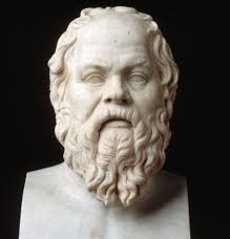
Email: ZYVC057@live.rhul.ac.uk
Total Article : 213
About Me:I'm a graduate student studying International Criminal Law and first started writing for King's News almost 4 years ago! My hobbies include reading, travelling and charity work. I cover many categories but my favourite articles to write are about mysteries of the ancient world, interesting places to visit, the Italian language and animals!

Politicians are sophists, they are concerned with winning an argument not with seeking the truth. Socrates sees himself as a philosopher. He states there is an ultimate Truth, there is one Truth for everything; that is why democracy is a waste of time as every opinion counts for democracy. The idea of one god coincides the idea of one truth in the middle ages, this conceptualisation is traceable to Socrates and Plato, only as a 'good' not 'god'
In regards to knowledge Socrates states we must apply a dialectic method, purely designed for truth. According to this method, if you have a theory and someone tries to contradict it, you will then eventually arrive to understanding true knowledge through this contradition. Through the dialectic approach in fact Socrates is asking what 'X' is in a world in which 'X' can be anything. An object is simply a representation of a form. Plato uses Socrates as his mouth piece and then builds on his teachers' assumptions.
Epistemology is the philosophical study of knowledge. The two greek terms stabnd for 'study' and 'knowledge'. How do we know things? Through experience, also cknown as empiricism or through innate knowledge, otherwise called rationalism? Your mind organises what you know, it is a priori. Concepts such as time or beauty are such regardless time or place.
Our language is able to turn qualities into substances, an adjective into a noun. White is a quality different things have, whiteness is a physical concept. Socrates isn’t a sophist but a lover of wisdom, he states that sophists play on the emotions of crowds.
For Plato beauty is a form or idea which transcends the idea of physical things. You can’t know what beauty is by looking at beautiful things, they cannot help you reach the idea of beauty, the form of beauty. To reach that you must look into your soul. The soul existed before the body and had direct contact with these forms but at birth our soul was with our body, the soul is imprinted with forms but in a form of recall.
What is knowledge? It could be like seeing, hearing or touching. Socrates in the republic argues that knowledge is like seeing, seeing needs three things whereas feeling and hearing need one. To see you need object, sight to see and light. If knowledge is reading the imprints on our soul we need to read so we need light.
The form of the question is in the language, it is a metaphorical trick our mind plays on us. Without the question what is beauty there would be no need to answer it. Socrates uses reason to get truth though he is aware he can’t reach it without god. Socrates appeals to reason not emotions.
Sounding neutral and scientific is what Socrates uses to convey information and teach. He says he is not a skilful speaker. Socrates has to answer to three charges: he teaches for a fee, he is an atheist or doesn’t believe in greek gods to which he distinguishes himself from Anaxagoras who says the sun is not a god but a lump of material, he was a naturalist but Socrates says he is not even interested in that, things above the heaven but he is interested in things on earth, how humans should live their life, based on questions which bring to truth. The oracle of Delphi said he was the wisest man so it dawned on him that he didn’t know what he should and that made him so wise, “scio non scire”.
Image: http://media-1.web.britannica.com/eb-media/69/75569-004-3B260631.jpg

0 Comment:
Be the first one to comment on this article.